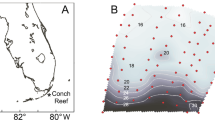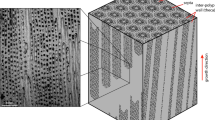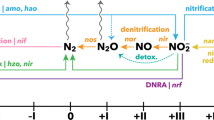Abstract
Reef corals, both fossil and recent, are potentially useful monitors of the surface ocean ‘climate’. Because coral reefs flourish only in relatively warm water1,2, the very presence of reef corals constrains the estimation of local temperature ranges. Studies of hermatypic corals have shown that coral growth rate3–8, density band formation (in some species)9–15, and stable isotopic composition14–23, all respond to variations in water temperature and light intensity. We have measured the stable isotopic composition of specimens of the branching reef coral Pocillopora damicornis which have grown in the field while seawater temperatures were continuously recorded. Detailed oxygen isotope profiles of branches of this species indicate that seasonal changes in temperature and seawater isotopic composition are precisely recorded. Isotopic profiles may be used to estimate growth rates of branching corals, which lack annual density banding. The method provides a technique for high resolution palaeoclimatic reconstruction of seasonal temperature ranges and accurate estimation of rates of reef carbonate production.
This is a preview of subscription content, access via your institution
Access options
Subscribe to this journal
Receive 51 print issues and online access
$199.00 per year
only $3.90 per issue
Buy this article
- Purchase on Springer Link
- Instant access to full article PDF
Prices may be subject to local taxes which are calculated during checkout
Similar content being viewed by others
References
Dana, J. D. Am. J. Sci. 45, 131 (1843).
Wells, J. W. Geol. Soc. Am. Mem. 67, 609 (1957).
Clausen, C. in Experimental Coelenterate Biology (eds Lenhoff, H. M., Muscatine, L. & Davis, L. V.) 246 (University of Hawaii, Honolulu, 1971).
Houck, J. E., Buddemeier, R. W., Smith, S. V. & Jokiel, P. L. Proc. 3rd Int. Coral Reef Symp. 2, 425 (1977).
Jokiel, P. L. & Coles, S. L. Mar. Biol. 43, 201 (1977).
Baker, P. A. & Weber, J. N. Earth planet. Sci. Lett. 27, 57 (1975).
Glynn, P. W. J. mar. Res. 35, 567 (1977).
Glynn, P. W. & Stewart, R. H. Limnol. Oceanogr. 18, 367 (1973).
Dodge, R. E. & Vaisnys, J. R. Nature 258, 706 (1975).
Hudson, J. H., Shinn, E. A., Halley, R. B. & Lidz, B. Geology 4, 361 (1976).
Knutson, D. W., Buddemeier, R. W. & Smith, S. V. Science 177, 270 (1972).
Weber, J. N., Deines, P., White, E. W. & Weber, P. H. Nature 255, 697 (1975).
Weber, J. N., White, E. W. & Weber, P. H. Palaeobiology 1, 137 (1975).
Emiliani, C., Hudson, J. H., Shinn, E. A. & George, R. Y. Science 202, 627 (1978).
Fairbanks, R. G. & Dodge, R. E. Geochim. cosmochim. Acta 43, 1009 (1979).
Weber, J. N. & Woodhead, P. M. J. J. geophys. Res. 77, 463 (1972).
Goreau, T. J. Proc. R. Soc. B196, 291 (1977).
Land, L. S., Lang, J. C. & Barnes, D. J. Mar. Biol. 33, 221 (1975).
Land, L. S., Lang, J. C. & Barnes, D. J. Geochim. cosmochim. Acta 41, 169 (1977).
Erez, J. Nature 273, 199 (1978).
Weber, J. N., Deines, P., Weber, P. H. & Baker, P. A. Geochim. cosmochim. Acta 40, 31 (1976).
Weil, S. M., Buddemeier, R. W. & Smith, S. V. Geol. Soc. Am. Meet. Abstr. 10, 513 (1978).
Weber, J. N. & Woodhead, P. M. J. Chem. Geol. 6, 93 (1970).
Dodge, R. E. & Thompson, J. Earth planet. Sci. Lett. 23, 313 (1974).
Forsbergh, E. D. Int. Am. Trop. Tuna Comm. Bull. 14, 49 (1969).
Barnes, D. J. thesis, Univ, Newcastle upon Tyne (1971).
Berger, W. H. & Killingley, J. S. Science 197, 563 (1977).
Epstein, S. & Mayeda, T. Geochim. cosmochim. Acta 4, 213 (1953).
Epstein, S., Buchsbaum, R., Lowenstam, H. A. & Urey, H. C. Bull. geol. Soc. Am. 64, 1315 (1953).
Killingley, J. S. & Berger, W. H. Science 205, 186 (1979).
Dunbar, R. B., Wellington, G. M., Glynn, P. W. & Druffel, E. M. Geol. Soc. Am. A. Meet. Abstr. 12, 417 (1980).
Craig, H. Geochim. cosmochim. Acta 12, 133 (1957).
Author information
Authors and Affiliations
Rights and permissions
About this article
Cite this article
Dunbar, R., Wellington, G. Stable isotopes in a branching coral monitor seasonal temperature variation. Nature 293, 453–455 (1981). https://doi.org/10.1038/293453a0
Received:
Accepted:
Issue Date:
DOI: https://doi.org/10.1038/293453a0
This article is cited by
-
A synthesis of paleomonsoon and associated processes from the unique depocenter, Andaman Sea
Geo-Marine Letters (2023)
-
Heat and freshwater changes in the Indian Ocean region
Nature Reviews Earth & Environment (2021)
-
Super instrumental El Niño events recorded by a Porites coral from the South China Sea
Coral Reefs (2018)
-
Use of skeletal Sr/Ca ratios to determine growth patterns in a branching coral Isopora palifera
Marine Biology (2017)
-
Evaluation of annual resolution coral geochemical records as climate proxies in the Great Barrier Reef of Australia
Coral Reefs (2014)
Comments
By submitting a comment you agree to abide by our Terms and Community Guidelines. If you find something abusive or that does not comply with our terms or guidelines please flag it as inappropriate.



